•Menu
•Tin đọc nhiều
-
 NSND
Thanh
Nam
và
nghệ
sĩ
Chí
Tâm
ngồi
ghế
nóng
"Chuông
vàng
vọng
cổ"
lần
thứ
19
-
2024
NSND
Thanh
Nam
và
nghệ
sĩ
Chí
Tâm
ngồi
ghế
nóng
"Chuông
vàng
vọng
cổ"
lần
thứ
19
-
2024 -
 Tâm
Sự
Thần
Y
4.0
Tâm
Sự
Thần
Y
4.0 -
 Thông
diệp
của
cải
lương
điện
ảnh
Thông
diệp
của
cải
lương
điện
ảnh -
 Nhiều
người
trẻ
tâm
huyết
với
nghệ
thuật
hát
bội
Nhiều
người
trẻ
tâm
huyết
với
nghệ
thuật
hát
bội -
 “Đêm
huyền
thoại”
quy
tụ
nhiều
ngôi
sao
sân
khấu
cải
lương
“Đêm
huyền
thoại”
quy
tụ
nhiều
ngôi
sao
sân
khấu
cải
lương -
 Thí
sinh
Lê
Hoàng
Nghi
đoạt
giải
Chuông
vàng
vọng
cổ
lần
thứ
19
–
năm
2024
Thí
sinh
Lê
Hoàng
Nghi
đoạt
giải
Chuông
vàng
vọng
cổ
lần
thứ
19
–
năm
2024 - Giữ bản sắc cho cải lương tuồng cổ
-
 CAILUONGVIETNAM.COM
13/04/2004
-
13/04/2025
CAILUONGVIETNAM.COM
13/04/2004
-
13/04/2025
•Tin ngẫu nhiên
-
 NSƯT
Diệu
Hiền
bật
khóc
khi
Khu
Dưỡng
lão
có
sân
khấu
mới
NSƯT
Diệu
Hiền
bật
khóc
khi
Khu
Dưỡng
lão
có
sân
khấu
mới -
 Vì
sao
Khánh
Ly
hủy
vé
máy
bay
không
về
viếng
Trịnh
Công
Sơn
vào
phút
cuối?
Vì
sao
Khánh
Ly
hủy
vé
máy
bay
không
về
viếng
Trịnh
Công
Sơn
vào
phút
cuối? -
 THÔNG
CÁO
SỐ
1
TỪ
CLVN
THÔNG
CÁO
SỐ
1
TỪ
CLVN -
 Đông
đảo
nghệ
sĩ
và
người
hâm
mộ
tiễn
biệt
NSND
Lý
Huỳnh
Đông
đảo
nghệ
sĩ
và
người
hâm
mộ
tiễn
biệt
NSND
Lý
Huỳnh -
 Hàng
rong
xưa
và
vài
món
ăn
chơi
ở
Sài
Gòn
trước
75.
Hàng
rong
xưa
và
vài
món
ăn
chơi
ở
Sài
Gòn
trước
75. -
 NSUT
Công
Ninh...gặp
Thạch
Sanh
NSUT
Công
Ninh...gặp
Thạch
Sanh -
 NSND
Viễn
Châu:
Giọt
nước
mắt
trên
quê
hương
NSND
Viễn
Châu:
Giọt
nước
mắt
trên
quê
hương -
 100
bài
vọng
cổ
của
Viễn
Châu
100
bài
vọng
cổ
của
Viễn
Châu -
 LỊCH
DIỄN
TỪ
NGÀY
6/5/2013
-
12/5/2013
LỊCH
DIỄN
TỪ
NGÀY
6/5/2013
-
12/5/2013 -
 SG
tài
danh
Nguyễn
Phương
ra
đi
đúng
ngày
tròn
98
tuổi
SG
tài
danh
Nguyễn
Phương
ra
đi
đúng
ngày
tròn
98
tuổi
•Thống kê truy cập
![]() Đang
truy
cập
:
484
Đang
truy
cập
:
484
•Máy chủ tìm kiếm : 12
•Khách viếng thăm : 472
![]() Hôm
nay
:
81942
Hôm
nay
:
81942
![]() Tháng
hiện
tại
:
1783248
Tháng
hiện
tại
:
1783248
![]() Tổng
lượt
truy
cập
:
100245347
Tổng
lượt
truy
cập
:
100245347
 »
Tin
Tức
»
English
»
Tin
Tức
»
English

CAILUONGVIETNAM.COM 13/04/2004 - 13/04/2025
Sắp tới đây là kỷ niệm 21 năm ngày thành lập trang web cailuongvietnam.com (13/04/2004 - 13/04/2025) Dây là trang tin tức đầu tiên của cailuongvietnam.com từ năm 2004. Còn đuọc gọi là CLVNCOM1 . Thân mời các dộc giả xem những bằi mới hơn tại trang tin tưc CLVNCOM2 theo link dưới dây https://www.cailuongvietnam.com/newscl
Frenchmen infuse Vietnamese folk music with new possibilities
Đăng lúc: Thứ hai - 13/01/2014 16:31 - Đã xem: 3909
Frenchmen infuse Vietnamese folk music with new possibilities
Vietnamese folksongs have been around for so long they have become a sort of familiar background that no one pays particular attention to.
But a group of French and Vietnamese musicians have tried to change this, making listeners alert to new possibilities and connections.
The VietVoDaHouse, founded in 2002 by Christian Bouaziz who plays the guitar and Patrick Genuite who sings in Vietnamese and is an electronics music composer, has blended blues/funk/electronic and jazz sounds with well-known Vietnamese folk songs like “Ly Ngua O,” “Trong Com,” and “Ru Em,” as also folksy love ballads like “Chim Da Da” and “Ca Dao Em Va Toi.”
Their work usually starts with complete rearrangement with the guitar, before adding electro sounds using machines like sampler, synthesizer, and drum-machine before applying the final dressing with singers and traditional musicians.
VietVoDaHouse is derived from the Vietnamese martial art (Viet Vo Dao) and house music, an electro genre born in the west in the 80s.
The Ho Chi Minh City-based group has some regular Vietnamese singers and musicians playing traditional instruments like the monochord dan bau, the 16-string zither dan tranh and flutes since 2003, but the members say they’re more like a collective that welcomes new members anytime.
More than 20 musicians have joined so far and the group’s special events have attracted serious attention, featuring as they’ve done, young singer songwriter sensation Le Cat Trong Ly, rapper Tien Dat and traditional music master Tran Quang Hai.
Bouaziz, also the group’s manager, said their work is inspired by “Tales from Vietnam,” a 1995 album made by French Vietnamese guitarist Nguyen Le with singer Huong Thanh, who was born into a cai luong (a form of modern folk opera in southern Vietnam) family and moved to France in the 90s.
“Their music was very jazz, which is obviously easier for people who are used to listening to jazz music to get the sound and rhythm of Vietnamese songs.”
Bouaziz said Nguyen Le was his childhood music idol, his first connection with Vietnamese music long before he had the idea of coming to Vietnam 20 years ago.
The interest led to the partnership with Genuite, who had made a lot of music in France before coming to Vietnam in 2000 to learn about the local music and instruments, particularly cai luong and the two-stringed Vietnamese instrument dan kim (moon lute) that he now plays for VietVoDaHouse.
Bouaziz said he and Genuite do not have the same taste in music, and it was not easy for Vietnamese musicians in the beginning to tune in.
“But at the end, when you’ve come to this level of relationship, things happen.”
Bouaziz said the idea of the project is to see people connected to the songs in different ways, drawing them to their familiar side of the work and then make them discover the other side.
He said the common first reaction of foreign listeners is “What is the language?” and then the curiosity extends to the instruments, especially the dan bau.
Dan tranh as a zither can be found in different kinds of music, but the dan bau, for a western audience, is a very unique way of playing music, he said.
Bouaziz said the reactions have not been good overall from the Vietnamese audience, although they usually make up the biggest crowd at their local concerts.
“It has generally stopped at them interested in the fact that some foreigners are interested in their instruments, their traditional songs and want to do some fusion.”
While the group is picking up the local attention, he felt there could be a problem with the public in the city, which is more a commercial than a cultural hub. He noted that the group attained better chemistry with listeners in Hanoi and the central region.
They played at the biennial Hue Festival in 2006 and the audience was more responsive. “They were more open and they reacted to the songs.”
Genuite, 43, from Sete, was in Hanoi for the third edition of annual electro music festival Hanoi Rock City last month (December 14-21). He said such events do not happen in HCMC.
“I think the reaction here is a little bit more passive.”
The response was also better in the Central Highlands town Da Lat, where VietVoDaHouse performed live on December 15 as part of the France in Vietnam year, marking 40 years of bilateral diplomatic relations.
But it was the reaction from the Viet Kieu (overseas Vietnamese)community that was most impressive. They became emotional, which was unexpected, Bouaziz said.
“They are accustomed to both Vietnamese sounds and western sounds, so they’re more attached to the way the songs remind them of their motherland, when they were younger and listened to them from their mothers.”
A lot of Viet Kieu came to see the band when they performed in Norway in 2008 at MELA World Music Festival and again during a national tour in 2010.
The group is expecting a lot of western and Viet Kieu audience as they play in France this February for the Vietnam in France year also as part of the diplomatic celebration, with their familiar collaborator Le Cat Trong Ly.
“We’re going to bring the western juice, a little bit of blue, rock guitar into Ly’s music, which is very light.”
Bouaziz said it will be the first time his project is presented in France.
“It’s funny because I’m involved both ways. I was the one who brought French juice and French taste and French influence into these musical events in Vietnam. But this time, I will be among the people who bring Vietnam’s taste and juice to France.”
Adaptation is bliss
Bouaziz said a lot of things happened “by accident,” as he talked about his 10-year project and two decades of living in HCMC.
The 47-year-old musician first came to the city in 1993 after finishing a two year mission with the French embassy in Malaysia.
Vietnam was opening up at the time and the 20-something youth from Bordeaux was planning a one-month adventure.
He said the city had few cars and no buildings then, and he would have left if he had not met the general manager of Saigontourist, who gave him a two-year marketing and communication assignment.
Calling himself “a southerner” for choosing to settle in HCMC, Bouaziz said the thing that keeps him in Vietnam is a dynamic that he could not describe, but one that he “would have a lot of problem to find in Europe.”
The group financed their own projects in the beginning, but since 2008, have only worked on projects financed by organizers.
He said VietVoDaHouse will not survive musically, and thus it has been developed more like a “global multi-disciplinary” project, expressing music in different formats.
“Sometimes we do rock in multimedia, sometimes we do only concerts like a band, sometimes we do creations, like the one in Da Lat which is a visual and musical project with a DJ.”
By Thuy Vi
Những tin mới hơn
- Ha Long Carnival to take place on April 30 (14/03/2014)
- MÁU NHUỘM SÂN CHÙA - YÊN LANG (18/03/2014)
- Remembering a hick (hai lua) named Sen (26/03/2014)
- Sad life stories of “Đờn ca tài tử” elite stars (01/04/2014)
- THE ORIGIN OF THE VONG CO SONG SẦU VƯƠNG Ý NHẠC (07/03/2014)
- Vietnamese artists scoop int’l photo prizes/ City to host first Ao Dai Festival (28/02/2014)
- Lunar New Year – a summary of the biggest traditional holiday in Vietnam (01/02/2014)
- Opens Restaurant on Dien Bien Phu Street, HCMC (10/02/2014)
- Don Ca Tai Tu Nam Bo receives UNESCO Award (14/02/2014)
- Vietnam's New Year satire censored (26/01/2014)
Những tin cũ hơn
- Remembrances: A Child’s Christmas in Dalat, Vietnam (24/12/2013)
- Cold front brings snowfall in Sa Pa Town (16/12/2013)
- Don ca tai tu recognized as UNESCO’s Intangible Cultural Heritage (06/12/2013)
- In Vietnam, the grass is redder on the other side (04/12/2013)
- Universal recognition (26/11/2013)
- Thirty five countries to participate in Hue Festival 2014 (14/11/2013)
- Artists commemorate musician Van Cao on 90th birth anniversary/ Musician Phan Huynh Dieu celebrates 90th birthday (14/11/2013)
- Vietnam singer fails to qualify for MTV Europe Music Awards (06/11/2013)
- Royal music gets folksy (22/10/2013)
- Dangerous Liaisons in English (15/10/2013)
Mã
an
toàn:
![]()
•CHUYỂN ĐẾN WEBSITE...
•Tin mới nhất
-
 CAILUONGVIETNAM.COM
13/04/2004
-
13/04/2025
CAILUONGVIETNAM.COM
13/04/2004
-
13/04/2025 -
 Thí
sinh
Lê
Hoàng
Nghi
đoạt
giải
Chuông
vàng
vọng
cổ
lần
thứ
19
–
năm
2024
Thí
sinh
Lê
Hoàng
Nghi
đoạt
giải
Chuông
vàng
vọng
cổ
lần
thứ
19
–
năm
2024 - Giữ bản sắc cho cải lương tuồng cổ
-
 “Đêm
huyền
thoại”
quy
tụ
nhiều
ngôi
sao
sân
khấu
cải
lương
“Đêm
huyền
thoại”
quy
tụ
nhiều
ngôi
sao
sân
khấu
cải
lương -
 Tâm
Sự
Thần
Y
4.0
Tâm
Sự
Thần
Y
4.0 -
 Thông
diệp
của
cải
lương
điện
ảnh
Thông
diệp
của
cải
lương
điện
ảnh -
 NSND
Thanh
Nam
và
nghệ
sĩ
Chí
Tâm
ngồi
ghế
nóng
"Chuông
vàng
vọng
cổ"
lần
thứ
19
-
2024
NSND
Thanh
Nam
và
nghệ
sĩ
Chí
Tâm
ngồi
ghế
nóng
"Chuông
vàng
vọng
cổ"
lần
thứ
19
-
2024 -
 Nhiều
người
trẻ
tâm
huyết
với
nghệ
thuật
hát
bội
Nhiều
người
trẻ
tâm
huyết
với
nghệ
thuật
hát
bội -
 Nghệ
sĩ
Bích
Thuận
qua
đời
Nghệ
sĩ
Bích
Thuận
qua
đời -
 Vở
"Sấm
vang
dòng
Như
Nguyệt"
-
dấu
ấn
mới
của
NSƯT
Chí
Linh,
Vân
Hà
Vở
"Sấm
vang
dòng
Như
Nguyệt"
-
dấu
ấn
mới
của
NSƯT
Chí
Linh,
Vân
Hà
•Đăng nhập thành viên
- Những Vở Diễn Hay KIỆT TÁC SÂN KHẤU THẾ GIỚI: LÔI VŨ
- Nghệ Sĩ Tâm Sự Ngọc Huyền 'vẫn bị cấm hát tại Việt Nam'
- Đời Thường Nghệ Sĩ Con dâu trẻ của NSUT Thoại Miêu qua đời chưa đầy 2 năm cưới
- Đời Thường Nghệ Sĩ Nghệ sĩ Tú Sương kết hôn với Việt kiều
- Tâm Tư Thành Viên Người trong giới tự nói gì về nghệ sĩ Mỹ Châu ?
- Trong bầu trời nghệ thuật sân khấu cải lương, nghệ sĩ Thành Được mãi là ngôi sao sáng vĩ đại. Ông đã...
- Tôi cũng biết một soạn giả có tên YÊN BA, nhưng tên thật là PHẠM DIỆP PHƯƠNG, là quân y, KBC 7019
- Bài viết khá đầy đủ về cuộc đời của thầy Văn Hải. Có vài lỗi chính tả không nên có
- thag điên nai ma diên cai gi . toan bac chuoc nsut thanh nam . bat chuoc kieu ngu
- Tôi rất mong chờ để được xem cải lương nhưng thật thất vọng.
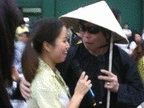
CAILUONGVIETNAM.COM 13/04/2004 - 13/04/2025
Sắp tới đây là kỷ niệm 21 năm ngày thành lập trang web cailuongvietnam.com (13/04/2004 - 13/04/2025) Dây là trang tin tức đầu tiên của cailuongvietnam.com từ năm 2004. Còn đuọc gọi là CLVNCOM1 . Thân mời các dộc giả xem những bằi mới hơn tại trang tin tưc CLVNCOM2 theo link dưới dây https://www.cailuongvietnam.com/newscl



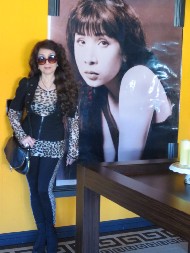






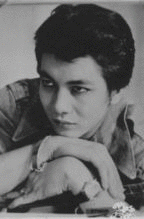
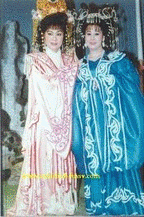














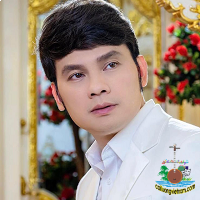
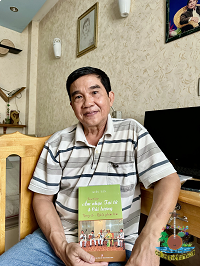










Ý kiến bạn đọc